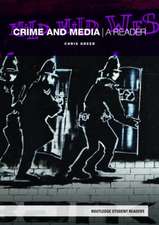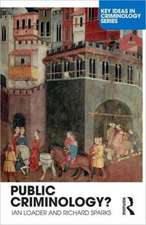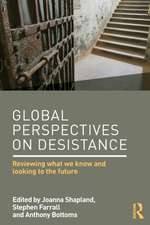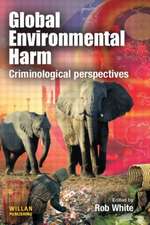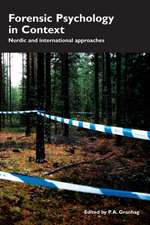Advancing Criminology and Criminal Justice Policy
Editat de Thomas Blomberg, Julie Brancale, Kevin Beaver, William Balesen Limba Engleză Hardback – 29 mar 2016
There has been a growing recognition of the importance of evidence-based criminal justice policies from criminologists, policymakers, and practitioners. Yet, despite governmental and professional association efforts to promote the role of criminological research in criminal justice policy, political ideologies, fear, and the media heavily influence criminal justice policies and practices.
Bridging the gap between research and policy, this book provides the best-available research evidence, identifies strategies for informing policy and offers direct policy recommendations for a number of pressing contemporary issues in criminal justice, including:
- Delinquency, intervention programs and community crime prevention,
- Problem-oriented policing and the science of hot-spot policing,
- Sentencing and drug courts,
- Community corrections, incarceration and rehabilitation,
- Mental illness, gender, aging and indigenous communities.
| Toate formatele și edițiile | Preț | Express |
|---|---|---|
| Paperback (1) | 509.43 lei 6-8 săpt. | |
| Taylor & Francis – 29 mar 2016 | 509.43 lei 6-8 săpt. | |
| Hardback (1) | 1348.81 lei 6-8 săpt. | |
| Taylor & Francis – 29 mar 2016 | 1348.81 lei 6-8 săpt. |
Preț: 1348.81 lei
Preț vechi: 1644.89 lei
-18% Nou
Puncte Express: 2023
Preț estimativ în valută:
258.13€ • 267.44$ • 215.43£
258.13€ • 267.44$ • 215.43£
Carte tipărită la comandă
Livrare economică 22 martie-05 aprilie
Preluare comenzi: 021 569.72.76
Specificații
ISBN-13: 9781138829220
ISBN-10: 1138829226
Pagini: 498
Ilustrații: 6
Dimensiuni: 156 x 234 mm
Greutate: 1.08 kg
Ediția:1
Editura: Taylor & Francis
Colecția Routledge
Locul publicării:Oxford, United Kingdom
ISBN-10: 1138829226
Pagini: 498
Ilustrații: 6
Dimensiuni: 156 x 234 mm
Greutate: 1.08 kg
Ediția:1
Editura: Taylor & Francis
Colecția Routledge
Locul publicării:Oxford, United Kingdom
Public țintă
Postgraduate and UndergraduateCuprins
Volume Introduction: Advancing Criminology and Criminal Justice Policy PART I: Introduction Introduction: Evidence, Evaluation, and Strategies for Moving Criminal Justice Policy Forward 1. Evidence-Informed Criminal Justice Policy: Looking Back, Moving Forward 2. Policy Evaluation and Assessment 3. The Role of Theory, Ideology, and Ethics in Criminal Justice Policy 4. Translational Criminology: A New Path Forward PART II: Crime Prevention Introduction: Individual, Family, and Community Prevention Programs 5. Juvenile Delinquency Prevention Programs 6. Opportunities for Public Policies to Strengthen Families and Prevent Crime 7. Community Crime Prevention 8. Situational crime prevention PART III: Policing and Court Sentencing Introduction: Policing 9. Community Policing 10. Problem-Oriented Policing: Evidence v. Framing in Implementation Success 11. The Science and Practice of Hot-Spots Policing Anthony Braga Introduction: Court Sentencing 12. Mandatory Minimum Penalties: Evidence-Based Consequences and Recommendations for Policy and Legal Reform 13. Sentencing Disparities 14. Sex Offender Legislation and Policy 15. Drug Courts and Drug Policy 16. Did the Gregg Decision Overcome the Arbitrary and Discriminatory Use of the Death Penalty So Prevalent in Furman? PART IV: Corrections and Rehabilitation Introduction: Community Corrections 17. Improving Correctional Supervision: What does the Research Tell Us? 18. Smart Sentencing Revisited: Assessing the Policy/ Practice Implications of Research on Electronic Monitoring and other Intermediate Sanctions Introduction: IncarcerationEditors 19. Confinement in Local Jails: Institutions and Their Clients Neglected by Criminologists 20. Does a Prison Term Prevent or Promote More Crime? Introduction: Reentry and Recidivism Reduction Programs 21. Reentry from Incarceration to Community: A Convergence of Practices based on Scientific Evidence to Enhance Citizenship 22. The Effects of Prison Programming 23. The Challenge of Integrating Restorative Justice into the "Deep-End" of Criminal Justice 24. Juvenile Justice Education Introduction: Special Populations 25. Inmates with Serious Mental Illnesses: Current Knowledge and Challenges for Practice 26. Women’s Incarceration and Motherhood: Policy Considerations 27. Aging and Dying in Prison: At the Intersection of Crime, Costs, and Healthcare 28. Native American Criminal Justice: Toward Evidence-Based Policy and Practice PART V: Conclusion Introduction: The Future of Criminology and Criminal Justice Policy 29. Mass Incarceration, the Carceral State, and Evidence-Based Research 30. The Media and Criminal Justice Policy and Practices 31. Cost-Effective and Accountable Criminal Justice Policy 32. The Utility of Findings from Biosocial Research for Public Policy 33. Bringing Evidence into Criminal Justice Policy
Notă biografică
Thomas G. Blomberg is Dean and Sheldon L. Messinger Professor of Criminology, and Executive Director of the Center for Criminology and Public Policy Research at Florida State University, USA.
Julie Mestre Brancale is a doctoral candidate and graduate research assistant for the Center for Criminology and Public Policy Research at Florida State University, USA.
Kevin M. Beaver is Professor in the College of Criminology and Criminal Justice at Florida State University, USA.
William D. Bales is Professor in the College of Criminology and Criminal Justice at Florida State University, USA.
Julie Mestre Brancale is a doctoral candidate and graduate research assistant for the Center for Criminology and Public Policy Research at Florida State University, USA.
Kevin M. Beaver is Professor in the College of Criminology and Criminal Justice at Florida State University, USA.
William D. Bales is Professor in the College of Criminology and Criminal Justice at Florida State University, USA.
Recenzii
For a quick, concise review of what is known about the effectiveness of current crime prevention practices and policies, this is your best resource. This volume provides a much needed critical assessment of contemporary criminal justice policy and practice. For a quick overview, this is the most comprehensive review available and the focus on policy is particularly welcome, given the limited credible evaluation evidence for this type of intervention.This scope of this volume is very broad, with short concise reviews of a wide range of current crime prevention practices and policies by the leading experts on specific types of intervention.
Del Elliott, Ph.D., Director, Program on Problem Behavior and Positive Youth Development, Institute of Behavioral Science, University of Colorado Boulder, USA
The editors have assembled a veritable who’s who of internationally renowned crime policy scholars for this volume, promising incisive reviews of critical issues across policing, courts, corrections, sentencing, and crime prevention. The authors deliver on that promise with precision, clarity, and insight. Skillfully weaving together theory, empirical evidence, and practical considerations to create a rich portrait of contemporary crime and criminal justice policy, each entry helps to clarify effective and cost-efficient ways forward. Notably, the essays also offer important counsel against relying on "common-sense" approaches to crime, which have often proven to be less than helpful and sometimes damaging. As the United States emerges from a period where ideology seemed to drive much of criminal justice policy, this book is essential reading for anyone who desires to have a meaningful impact on public safety.
Brandon K. Applegate, University of South Carolina, USA
The American public’s concern about crime and the criminal justice has reached unprecedented levels. Media coverage of police killings of civilians has raised awareness about police use deadly of force, and data showing that the U.S. has the highest incarceration rate of any industrialized nation has spurred calls for reform. The pressure to "do something" about crime is strong. But past policies have often been based on sound bites and not empirical evidence. This book changes that. Advancing Criminology and Criminal Justice Policy is a sophisticated and intelligent book that covers an impressive array of topics. Each chapter summarizes the best available evidence on crime and crime control but—more importantly—it considers how scientific knowledge can be used to design better strategies. The contributing authors are all trusted experts, and each chapter is concise, accessible, and jargon-free. The succinct introduction to each major section makes this an ideal textbook for criminology courses. But the book isn’t just for the classroom. Advancing Criminology is a must read for anyone interested in reforming criminal justice in America.
Joan Petersilia, Adelbert H. Sweet Professor of Law, Stanford Law School, USA
This book provides, through examples and thoughtful writings, evidence-based research strategies that can be used with policy makers to make improvements in both individual and community justice in our dynamic criminal justice system.
Patricia Brantingham, University Professor of Computational Criminology, Simon Fraser University, Canada
This is clearly the single best volume on the subject of evidence based criminal justice policy. It should be an indispensable resource for scholars, practitioners, and students. I recommend it without reservation.
Malcolm M. Feeley, Claire Sanders Clements Dean's Professor, Boalt Hall School of Law, University of California at Berkeley, USA
Advancing Criminology and Criminal Justice Policy offers a timely and important collection of essays by an internationally-renown set of scholars who are the fore of bridging the criminological/criminal justice divide. It is refreshing to see the authors demonstrate that our field cannot do one without the other. As criminologists, our main task is to conduct the most objective scientific work possible within the constraints of the data we have. Getting that material in a palpable way to practice and policy audiences is also necessary if we are to be ‘at the table’ when it comes to informing the policy response to crime and criminals. Blomberg and his colleagues have done our field a huge service. This book is stellar.
Alex R. Piquero, PhD, Ashbel Smith Professor of Criminology, University of Texas at Dallas, USA
Del Elliott, Ph.D., Director, Program on Problem Behavior and Positive Youth Development, Institute of Behavioral Science, University of Colorado Boulder, USA
The editors have assembled a veritable who’s who of internationally renowned crime policy scholars for this volume, promising incisive reviews of critical issues across policing, courts, corrections, sentencing, and crime prevention. The authors deliver on that promise with precision, clarity, and insight. Skillfully weaving together theory, empirical evidence, and practical considerations to create a rich portrait of contemporary crime and criminal justice policy, each entry helps to clarify effective and cost-efficient ways forward. Notably, the essays also offer important counsel against relying on "common-sense" approaches to crime, which have often proven to be less than helpful and sometimes damaging. As the United States emerges from a period where ideology seemed to drive much of criminal justice policy, this book is essential reading for anyone who desires to have a meaningful impact on public safety.
Brandon K. Applegate, University of South Carolina, USA
The American public’s concern about crime and the criminal justice has reached unprecedented levels. Media coverage of police killings of civilians has raised awareness about police use deadly of force, and data showing that the U.S. has the highest incarceration rate of any industrialized nation has spurred calls for reform. The pressure to "do something" about crime is strong. But past policies have often been based on sound bites and not empirical evidence. This book changes that. Advancing Criminology and Criminal Justice Policy is a sophisticated and intelligent book that covers an impressive array of topics. Each chapter summarizes the best available evidence on crime and crime control but—more importantly—it considers how scientific knowledge can be used to design better strategies. The contributing authors are all trusted experts, and each chapter is concise, accessible, and jargon-free. The succinct introduction to each major section makes this an ideal textbook for criminology courses. But the book isn’t just for the classroom. Advancing Criminology is a must read for anyone interested in reforming criminal justice in America.
Joan Petersilia, Adelbert H. Sweet Professor of Law, Stanford Law School, USA
This book provides, through examples and thoughtful writings, evidence-based research strategies that can be used with policy makers to make improvements in both individual and community justice in our dynamic criminal justice system.
Patricia Brantingham, University Professor of Computational Criminology, Simon Fraser University, Canada
This is clearly the single best volume on the subject of evidence based criminal justice policy. It should be an indispensable resource for scholars, practitioners, and students. I recommend it without reservation.
Malcolm M. Feeley, Claire Sanders Clements Dean's Professor, Boalt Hall School of Law, University of California at Berkeley, USA
Advancing Criminology and Criminal Justice Policy offers a timely and important collection of essays by an internationally-renown set of scholars who are the fore of bridging the criminological/criminal justice divide. It is refreshing to see the authors demonstrate that our field cannot do one without the other. As criminologists, our main task is to conduct the most objective scientific work possible within the constraints of the data we have. Getting that material in a palpable way to practice and policy audiences is also necessary if we are to be ‘at the table’ when it comes to informing the policy response to crime and criminals. Blomberg and his colleagues have done our field a huge service. This book is stellar.
Alex R. Piquero, PhD, Ashbel Smith Professor of Criminology, University of Texas at Dallas, USA
Descriere
This book offers an authoritative and comprehensive overview of criminal justice policy from crime prevention to rehabilitation and brings together leading experts in the field to discuss how criminology can advance sound and evidence-based policy.




